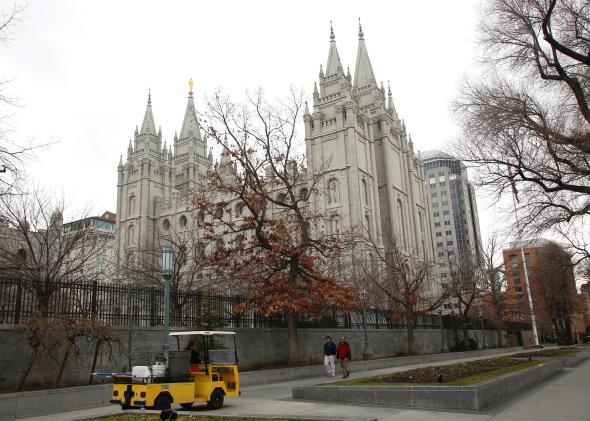Last week, Utah’s governor signed a historic bill that extends state antidiscrimination protection to LGBT people in housing and employment. The law will extend needed protection to tens of thousands of Utah’s citizens. Remarkably, this has happened in a state with a Republican legislature and a Republican governor. That development is remarkable and salutary.
Because Utah’s bill has been supported not only by the Mormon church, but also by the ACLU and other advocates for LGBT rights, it is being hailed as a model for other jurisdictions. When he signed the bill, Gov. Gary Herbert said, “I have no doubt that the eyes of the nation are upon us,” and he called lawmakers’ attempts to strike a balance between religious freedom and LGBT equality “historic.”
But the Utah legislation should not become a model for the nation. The bill contains troubling exemptions for religious groups, allowing them to continue to discriminate in ways that would be impermissible in many other states and under federal law. In particular, the Utah law specifically exempts religiously affiliated nonprofits such as schools, hospitals, and social service organizations.
Consider the example of Burke Wallace, a football coach and English teacher at a private high school in California. He says he was fired from his coaching position after he was overheard referring to his husband “in passing.” A common conviction driving the Utah legislation is that the school should not be able to fire him for being married to another man. Yet under the law’s broad religion exemptions, a religiously affiliated private school could do just that.
Nonprofits like these can be huge employers, providing thousands of jobs. That is why they are covered under most civil rights laws, including the federal Civil Rights Act of 1964. Even churches are covered by the federal law, with narrow exceptions for hiring people of the same religion and for ministerial employees. Outside those limited exceptions, employment discrimination laws generally apply to all nonprofits, including religious ones. As we have previously argued, American law recognizes that nonprofit employers can affect economic opportunity and equal social standing, even if it gives more latitude to churches and to religious nonprofits when restricting employment to co-religionists.
To see the tension between Utah and the rest of the country even more clearly, consider the divergent positions of civil rights groups. Just this past summer, the ACLU and many other LGBT advocacy groups withdrew support from the federal Employment Nondiscrimination Act, or ENDA, after the Supreme Court’s decision in Hobby Lobby. They did so precisely because ENDA contained broad religion exemptions similar to the ones in the Utah law. They were right to pull out of the ENDA negotiations. Yet those very same groups have supported the Utah legislation. Why?
The best answer is that Utah law is anomalous in this regard. Even before the new legislation, religiously affiliated nonprofits probably were not required to abide by state employment discrimination law. In other words, they could already discriminate in hiring on the basis of race, gender, and religion. So the new Utah bill likely just brought protections for LGBT people up to the minimum level already provided to other minorities against discrimination by nonprofit employers in Utah. And that does some good, because federal employment discrimination law still provides no protection to LGBT people.
(An exception to this strategy may be the bill’s explicit exception for the Boy Scouts of America, which has withdrawn its opposition to LGBT scouts but continues to discriminate against troop leaders. The Utah law may well reduce protection for LGBT troop leaders, giving them less protection than they previously had before in the state.)
Other developments in Utah have been troubling, too. Nothing in the new legislation protects LGBT groups against discrimination when they are customers in public accommodations, such as restaurants, hotels, or theaters. And another bill that recently passed the state legislature would allow county clerks to decline to solemnize marriages, as long as they designate someone to solemnize those unions in their place. Such exemptions are fundamental departures from the duty of public officials to serve all citizens without distinction. But because these other developments have not drawn the support of civil rights advocates, they are not as likely to serve as templates for other states as the law that the governor signed last week concerning employment and housing.
So, while civil rights organizations correctly supported the Utah bill, which provides important protection for LGBT citizens in hiring and housing, Utah should not lead the nation on this matter. Only against the backdrop of that state’s narrow civil rights laws should this law be seen as a victory.
